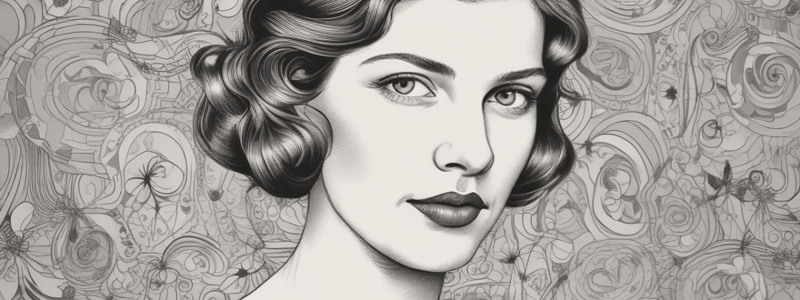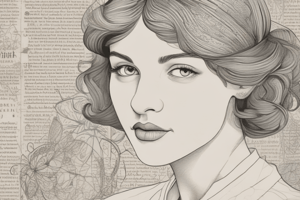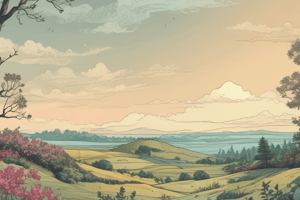Podcast
Questions and Answers
in 'Black Rook in Rainy Weather', what tone does Plath convey in the line 'backtalk / from the mute sky' and how does she achieve this tone?
in 'Black Rook in Rainy Weather', what tone does Plath convey in the line 'backtalk / from the mute sky' and how does she achieve this tone?
The tone is honest and vulnerable, which is achieved through personification.
In 'Black Rook in Rainy Weather' What significance does the 'minor light' hold for Plath, and how does she describe its influence?
In 'Black Rook in Rainy Weather' What significance does the 'minor light' hold for Plath, and how does she describe its influence?
The 'minor light' is a source of inspiration and connection to the natural world, which Plath describes as 'lean[ing]' from ordinary objects, making the moment special.
In 'Black Rook in Rainy Weather', what literary device does Plath use to describe the rook's beauty, and what effect does this have on the reader?
In 'Black Rook in Rainy Weather', what literary device does Plath use to describe the rook's beauty, and what effect does this have on the reader?
Plath uses sibilance to describe the rook's beauty, which creates a euphonic and exuberant effect, evoking joy and wonder in the reader.
Flashcards are hidden until you start studying
Study Notes
Poem Structure and Style
- The poem consists of structured stanzas, each with five lines, except for the final line.
- Hidden rhyme is used through similar consonance at the end of each line.
- Enjambment is used to create pace, and distinct caesurae are used to separate ideas.
- The poem features perceptively chosen imagery, sibilance, and assonance for striking aural qualities.
Themes and Ideas
- The poem explores the poet's relationship with the natural world and its capacity to inspire.
- It highlights the need for inspiration and the interplay between humanity and nature.
- The poem touches on the idea of divine power and its influence on the writer's process.
Imagery and Symbolism
- The black rook is a symbol of bleakness and downtrodden mood, created through pathetic fallacy.
- The use of verbs like "hunches" creates a closed-off and unwelcoming atmosphere.
- The natural world is portrayed as having the power to inspire, even in its mundane aspects.
Tone and Narration
- The poem is written in first-person narrative, introducing the poet's thoughts and feelings.
- The tone is candid, vulnerable, and honest, with a sense of nervousness and hesitation.
- The poet appears reassured by the possibility of connection with the natural world.
Key Quotes and Analysis
- "I do not expect a miracle / Or an accident" - The poet sets a tone of lowered expectations.
- "A certain minor light may still / Lean incandescent" - The poet describes the possibility of inspiration from the natural world.
- "Whatever angel may choose to flare / Suddenly at my elbow" - The poet juxtaposes the idea of a divine being with a casual tone.
- "A brief respite from fear / Of total neutrality" - The poet wishes for a break from the fear of losing inspiration.
- "Miracles occur. If you care to call those spasmodic / Tricks of radiance / Miracles" - The poet is hesitant to label moments of inspiration as miracles.
Studying That Suits You
Use AI to generate personalized quizzes and flashcards to suit your learning preferences.




